Too Many Drummers.com
-
my music
website
Journal 1 - The Land Downunder
Journal 2 - Indonesia
Journal 3 - Singapore & Malaysia
Journal 4 - Thailand 1
Journal 5 - Thailand 2
Journal 6 - Indian Ocean
Journal 7 - Red Sea
Journal 8 - Egypt
Journal 9 - Suez to Israel to Petra
Journal 10 - Turkey
Journal 11 - Greece & Italy
Journal 12 -
Balearics, Gibraltar, Canaries
Journal 13 -
Canaries to Cape Verde to Atlantic
Journal 14 - Barbados to
Grenada
Journal 15 - Trinidad
Journal 16 - Bahamas DC-3 Plane Wreck
Journal 17 - 34 Things I've Learned in 33,000 Miles
BALEARICS, GIBRALTAR, CANARIES
Our tour across the globe continues at breakneck speed!
Perhaps the biggest change on board Exit Only since my last journal entry is
Sarah's return to the USA. Alas, the time has come for her to resume her
professional career. Hopefully she'll be able to visit the boat frequently
as we get nearer to America. Don't be surprised if her Journal page blossoms
with new entries once we hit the Caribbean.
Until then, Sarah's departure means I have lost my will to groom. Since I
haven't combed my hair in nearly 18 months, this turns out not to be such a
big deal.
Last month I uploaded a brand new
www.toomanydrummers.com website to aid in
the endless search of a fulfilling online experience. The TMD site provides
insight and info into the music I write and record during this boat trip. It
currently features a new song called "Carousel" I recorded in my cabin at
anchor in Gibraltar.
Mahon, Minorca (Balearic Islands)
Our trip through the western Mediterranean was largely a tour of colonial
Spain. Our first stop in the Balearics was in Mahon, on the island of
Minorca. Much to our surprise, our arrival coincided with a weeklong local
festival called "Festes de Gracias". Here's an entry from my TMD web journal
describing one memorable festive experience:
"10 September 2005 - Last night was the opening of the Fiesta de
Gracias. I'm not sure what the party is specifically thankful for, but lots
of people are taking part. Sarah and I went to an ice cream parlor where I
saw Slurpy-like machines spinning delicious ice-cold bins of sugary delight,
so (naturally) I ordered one. The lady asked me if I wanted a "pico?" (small
cup) or "grande?" (large cup), to which I loudly cried "GRANDE!". I should
have realized something was up when the lemon ice drink cost 3 euros (about
$3.50). Surprised at the expense but not wishing to embarrass the shop
owners by making a big deal out of it, I handed over the dough and was given
a unexpectedly lukewarm glass of lemonade. I was disappointed that the lemon
drink wasn't icy, but having got this far without making a fuss there was
nothing to do but throw my head back and take an enormous swig of my
over-expensive, dishwater warm, lemon-flavored.....GIN?!?
I don't like the taste of alcohol in the best of conditions, but when I was
expecting a sweet (albeit, warm) glass of lemonade to wash across my taste
buds, the gin came as something of an apocalyptic shock. I could have been
cool about it...maybe coughed and done one of those macho chest-pounding
things....I could have laughed and been graceful about the
misunderstanding....but instead I went with my first instinct and yelled: "Blaaaaaaaaaaaaaaaaaaaaaauuuuuuugh!"
at the top of my lungs. Sarah said it was overly theatrical, but she hadn't
just had her esophagus blowtorched.
The shop owners were concerned that something was horribly wrong with their
lemon/gin drink, so
they pulled out little cups, sampled the brew, and nodded in satisfaction.
This is how I discovered that Minorca is famous for its home grown gin.
Lemon gin drink seems to be a fiesta favorite. At night the streets are
packed with dancing locals clutching lime colored water bottles. I think the
people who mooned Mom and Dad at the internet cafe were fans of the brew."-
end of journal entry
After such a brutal assault, my taste buds were thrilled to discover a
street market overflowing with festival candy....bins of brightly colored
marshmallows and licorice delight lying within easy reach of overlarge,
ergonomic candy scoops....it was like stumbling across an Oompa-Loompa
convention. My instinctive response ("Let's try one of each!") quickly got
expensive, but neon Gumballs of Destiny cannot be denied.
Palma, Mallorca (Balearic Islands)
Palma has been a tourist town for over a century. Today, colonial buildings
serve as lodgings for stores like the Gap and Body Shop. Unfortunately the
combination of tourist prices and a poor exchange rate can make Mallorca an
expensive stop.
One of the best things about cruising is that we take our home with us as we
travel. Unless we stay in a marina, we don't pay for lodging. This means
cruisers can enjoy places like Palma without breaking piggy banks...and
since boats have a limited carrying capacity, the temptation to buy
extraneous souvenirs is minimal. Internet cafes, phone bills, and ice cream
are the big expenses.
I mention the cost of living because Palma has 3 massive marinas where 1
night of berthing for our boat costs 99 euros ($120 US). Thankfully we found
a quiet bay just outside of town to drop anchor for free.
In Palma, Sarah and I were able to continue our tradition of visiting IKEA
stores around the globe.
Our streak of not buying anything on those visits also remains intact (IKEA
meatballs with mulberry sauce don't count as a purchase...they are a
necessity).
I was delighted to discover flamenco guitarists in our wanders around the
city. Most played classics like "Ave Maria" and "Romanza" (popular songs to
get tourists' attention), but occasionally we came across a minstrel
pounding and strumming their guitar with real flamenco passion.
Mom and Sarah flew back to America from Palma, leaving Dad and I to sail 500
miles to Gibraltar on our own.
Whale of Tale
You would think extended sailing passages would be indistinguishable from
each other, but each one takes on its own flavor. Our trip from Mallorca to
Gibraltar was more eventful than either of us expected.
The wind was light, which made for flat seas and lots of motoring. On our
second day Dad noticed
an unusual white dot on the horizon and changed course to investigate. To
our delight it turned out to be an enormous rubber fender someone had lost
overboard. Judging from the algae growth on the handle it had been floating
for a couple of weeks.
Salvaging the bounty of the sea is not uncommon in these highly traveled and
frequently rough waters. One inopportune wave can wash a poorly secured boat
clean of deck-top gear. Just yesterday we talked to a fellow cruiser who ran
across an abandoned dinghy floating in open ocean. After scraping a great
deal of growth off the boat's bottom and replacing the stale fuel in the
engine, it is fully operational. Of course if anyone finds anything with
another yacht's name on it, they make every effort to return the gear.
On the fourth day we saw more mysterious bumps on the horizon....and 10
minutes later We were nose to nose with a momma pilot whale and her baby
cruising just beneath the surface. They hung out an hour and a half photo
session. 30 minutes into our whale watching experience, papa whale steamed
back to find us filming his family. He cruised up to the boat, blew a
massive air bubble, dove, then surfaced between our hulls to gave us a
squeaky telling off. It was amazing to see this massive animal lay the smack
down on us. I guess he didn't think we were much of a threat, because he
soon swam off again and left his lady behind for more photos. You can see
some of our whale encounter footage on the video page.
In retrospect I'm glad I don't have a waterproof case for the video camera.
I'd hate to imagine what papa whale would have done if he'd caught me
swimming paparazzi-style around his brood.
Back to the voyage....Every cruiser has to decide how they want to handle
watch schedules on long
passages. The biggest risks are cargo ships, fishing fleets, and squalls
(localized storms). Most of these dangers can be alleviated by having an
alert crewmember scan the horizon every few minutes. When you have four
people on board it is relatively easy to set a clear cut watch schedule, but
with just two of us it works better for the least tired person to stand
watch while the other person sleeps. When the person on watch can't keep
their eyelids open, it's time to swap places.
We spent the last couple days of the passage dodging ship traffic and
fighting counter currents. I had my first glimpse of "the Rock" at the
dawning of the sixth day.
The Rock
To quote Dad: "Gibraltar has more history per square inch than anywhere else
on the planet."
It's hard to imagine how many battles have been fought over this little
parcel of land. Just 10 miles from the northern coast of Morocco and sitting
at the mouth of the Mediterranean Sea, Gibraltar has great strategic
importance....at least it used to.
It didn't take long to figure a few things out:
1. Gibraltar is called "the Rock" because it is one.
2. Those mountains across the bay are in Africa.
3. Dad and I were going to eat a lot of McDonalds until Mom returned.
Gib (that's what the locals call it) is located on the southern tip of
Spain, right next to the border town of La Linea. The Rock's small size mean
high real estate costs, so many Gibraltareans commute daily from homes in
Spain. Everyone seems to speak English and Spanish fluently, and
conversations constantly flip from language to the other.
Spain and England haven't always gotten along so well, which is why the Rock
contains 32 miles of
tunnels. These tunnels lead to holes in the cliffs... perfect vantage points
for the British gunners and their cannons. Over the years there were 13
sieges of the Rock by various armies, but the Brits couldn't be budged from
their elevated rocky fortress.
A steady stream of cruise ships come through Gib, disgorging hundreds of
tourists in search of duty free liquor, cigarettes, and electronics (which
brings me to an question: Is duty free really cheaper? In my experience
"duty free" always translates as "overpriced").
In Gib we discovered the World's Most Expensive Internet Cafe. $7 US for one
hour...and since it is technically possible to check email in less than five
minutes, the cafe blasts loud music carefully selected to scramble brain
waves. I don't know what laws of nature they are exploiting, but simply
opening a hotmail account takes the better part of 45 minutes.
When we weren't getting ripped off at the internet place, Dad and I did boat
maintenance. More
accurately, Dad did the work while I filmed him. If you're feeling
frustrated and overworked, watch Dad single-handedly accomplishing a
two-man sail folding job on our video page...it's guaranteed to make you
feel better about your work load.
Gibraltareans care a lot about their vehicles. They seem to have fallen in
line with the street racing craze sweeping through the First World (and
other places people have more money than sense).
Customized spoilers, hyper waxed finishes, giant chrome rims, DVD players,
and monster sound
systems abound....and that's just the motor scooters.
One of Gib's main tourist attractions is a large population of Barbary apes.
The apes were originally brought to the Rock by British sailors who gave
birth to the legend that "as long as there are Barbary apes on Gibraltar,
the English will retain control of the Rock". When the apes died out,
Winston Churchill arranged for a quick shipment
from Africa to ensure the continuation of British rule.
To be honest, everything in the previous paragraph could be a lie. It's hard
to be certain because I heard about twelve different versions of the story.
I lost count of the number of times we were told not to feed the apes...A
warning which unlocked the rule-breaking fiend lurking in every tourist
soul. Everyone fed the apes, including the tour guide who warned us not to.
If you go to Gib don't be surprised when the apes tug on your pant leg to
let you know they want M&Ms...they've been highly trained.
Extreme Passage to the Canary Islands
After 5 weeks in Gib, we were ready to move on. A friend from our off-roading
days in Saudi Arabia has joined us for the trip from the Rock to the
Caribbean. His name is Morgan and he's getting a crash course in cruising.
The first two days down the coast of Morocco had light winds and smooth
seas. We didn't push the
boat hard since we didn't want to stress test the new rigging we had just
installed in Gib. Instead we contented ourselves with sailing along at 2-3
knots.
Day Three: Everything changed. Bam! Blindsided by a cold front! None of the
weather faxes or forecasts predicted the massive weather shift, but there is
no arguing with 30-40 knot winds and 20 foot seas. Our relaxed drift became
a bouncy bobsled ride on the borderline of control.
Fortunately we were heading in the same direction as the wind, which meant
we could surf down the
waves instead of pounding into them. And by "surfing" I mean exactly that.
Under a small amount
of sail we kept our boat speed around 6 knots...but big waves behind us
accelerated our boat speed into the 15 knot range. Twice we saw speeds of
more than 18 knots on our speedometer.
As fun and exciting as it might sound, when you are in heavy Atlantic Ocean
weather it is best to play it safe. All cruising yachts use autopilots to
steer their boats to avoid constant hand-steering. Sometimes autopilots can
get overwhelmed by rough conditions. If our autopilot over-steered at a
speed of 18 knots and turned the boat sideways to the next wave, very bad
things could happen:
a) we could break the autopilot and have to hand steer 24 hours a day for
the next 4 days
b) we could get swamped by a breaking wave and get extremely and
unpleasantly wet
c) we could flip the boat over (unlikely, worst possible scenario)
Time to slow the boat down....bringing up the interesting dilemma as to how
we were planned to do it. We couldn't take down any sail since the autopilot
needed some sail power in order to steer.
We could put the engines in reverse but that would be stupid. We could turn
into the waves but that would be insane and in the wrong direction. There
was really only one option: taking it in turns to swim in the water with a
line tied around our waist.
Just kidding. We "streamed warps" behind our boat. This is nautical jargon
which means "throw
some ropes in the water to create drag and slow down". Sometimes warps are
also called "drogues". It was the first time we've pulled drogues and we
were very impressed with their effectiveness. Our 15+ knot surfs slowed to
under 10 knots and our average boat speed dropped to
5 knots.
The autopilot was happy. Mom was happy. Morgan was happy. Dad was happy. I
put away my surfboard and sulked.
Our video page features some footage from the Canary Islands passage. If you
want to see how
drogues work and what it's like to careen downwind in 40 knots of wind,
click
here.
|
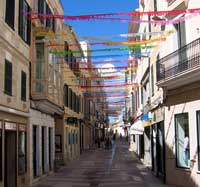
Party time....
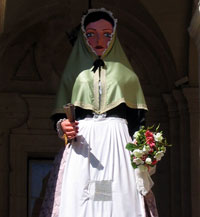
....or not.
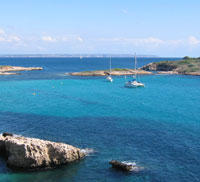
The free anchorage
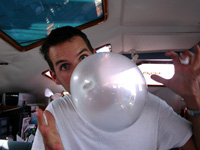
Blissful Oompa Loompa joy
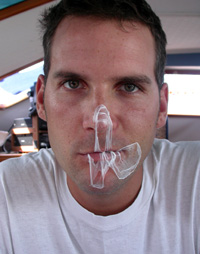
Sarah burst my Oompa Loompa joy
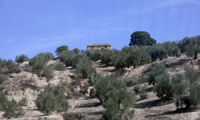
The Med taught me the beauty of olives.
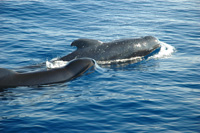
Mama and Baby
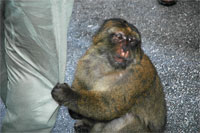
Feed them or they steal your pants.
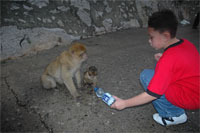
(a conversation two minutes before this photo)
Tour Guide: "Don't feed the apes."
Guileless
Child: "OK."
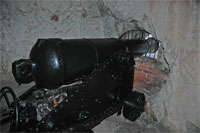
Little known fact: This is how the phrase
"Make my day." was popularized
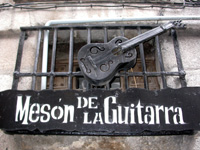
I could live here
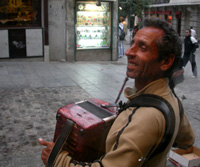
Funky accordion rocker
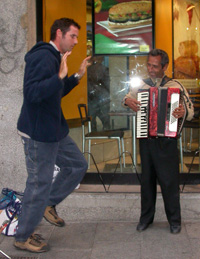
The Running Man....MC Hammer's timeless contribution to my extensive dance
repertoire
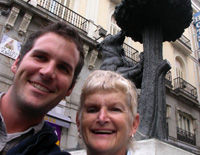
Mom and I with Madrid's famous bear statue
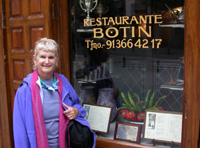
This restaurant is famous because
Ernest Hemingway ate here
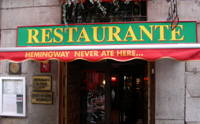
This restaurant is famous because
Hemingway didn't eat here
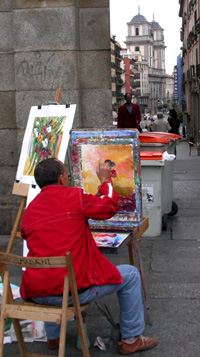
All my Spanish friends want to be painters
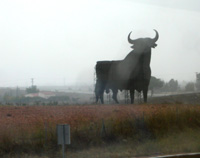
Go ahead....wave something red. I dare you.
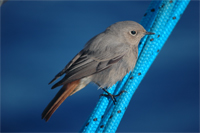
Mid-ocean stowaway
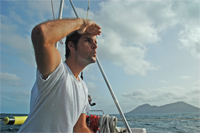
Searching for land

Putting the brakes on |

